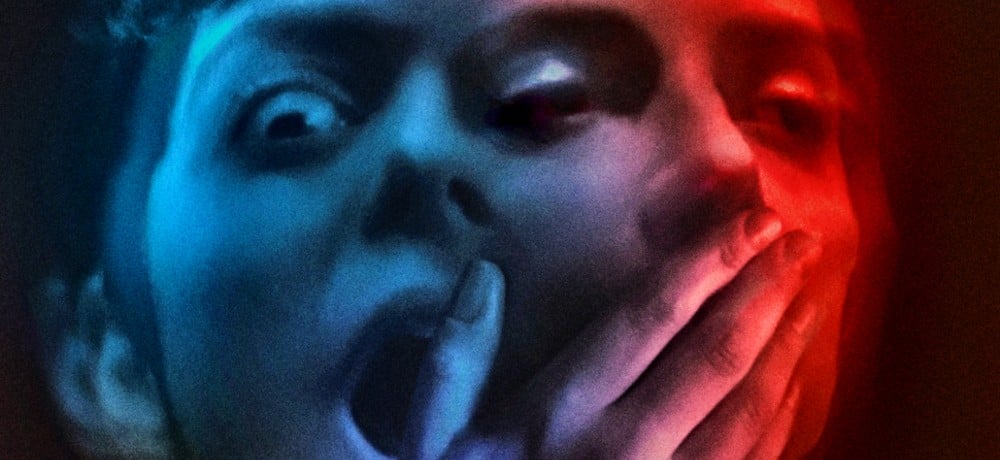






Ryan J. Sloan's feature debut Gazer is a pensive puzzler that keeps the audience at arm's length. Its traits are grainy visuals, an untrustworthy narrator, and chilly noir vibes on a low frequency. Sloan and co-writer Ariella Mastroianni (who plays the film's time-blind lead) explore a New Jersey mystery that keeps methods low and slow. Gazer's an intimate thriller with a hyper-focused scope, but it's also a lethargic experience by choice. Visual storytelling is everything to Sloan's approach, perhaps to a detriment.
Mastroianni stars as Frankie Rhodes, a young single mother who struggles to perceive lengths of time. The neurological condition, known as "dyschronometria," prevents her from holding down simple jobs like being a gas station attendant. She uses self-recorded cassette tapes that remind her to pay attention, as she tries to fixate on details—she gazes into windows and, in her head, creates lives for unknown people. One of those people, Paige (Renee Gagner), approaches Frankie and, after hearing her predicament, offers a quick cash opportunity. All Frankie has to do is rescue Paige's car from her abusive brother, Henry (Jack Alberts), and she'll receive $3,000. Frankie hopes it's an easy score, but paranoia settles in when Paige doesn't show.
Gazer is understated with intent, which is problematic at nearly two hours. Sloan and Mastroianni cross paths with Memento-like narratives where continuity is held hostage. Suspense derives from Frankie's condition, as she investigates Paige's disappearance while not fully remembering her part in everything. We can't fully comprehend Frankie's situation because she cannot herself, which keeps us in a suspended state of distrust. There's intrigue to Frankie's condition, the desperation behind her money-focused actions, and her gumshoe strategies, but it's reliant on slow-burn tension that simmers, and simmers, and simmers…
Sloan's visuals transport us back to a 70s-era grain, shot on 16mm. Cinematographer Matheus Bastos doesn't have much to work with as Frankie wanders around her vacant New Jersey neighborhood, just undecorated apartment cells and industrial plant floors. There's a grit and smut to the picture quality that aligns with noir atmospheres, but the bygone allure of outdated imagery feels coldly one-trick. Bastos rattles a handheld camera to mimic Frankie's instability, yet there's an emptiness to shots that become repetitive over the film's drawn-out length.
Through Frankie's increasingly frantic attempts to piece together Paige's whereabouts, Mastroianni loses herself to dyschronometria's effects. It's a skittish, vulnerable, and hefty performance that weaves in and out of consciousness. To play a character that inevitably doubts herself because of an illness she cannot prevent is tough, but Mastroianni succinctly projects Frankie's hurricane of emotions raging within. She's a mother who barely sees her daughter, a loner who spies on strangers, and an accidental suspect in a missing person case. It's a mountain for any performer to climb, but Mastroianni's proverbial footing is sure and precise.
That said, Gazer tends to meander, and while that's narratively consistent with Frankie's situation, it makes for a strange and sometimes sleepy experience. What Sloan accomplishes with so little, stringing together this lo-fi private eye tale in the backroads of New Jersey, is impressive. Frankie's hesitations become our hesitations, and dream sequences enter this bizarre realm for brief asides into the morbid and upsetting, but this float-through-the-air pacing loses itself along the way. What's happening isn't particularly complicated, yet there's almost two hours' worth of the same discombobulation. You must find yourself on the film's wavelength early and be one who indulges in slinking, shuffle-step storytelling. Scenes begin to hazily blur together, not in the suggestive ways Sloan intends.
I wish I had sunk into Gazer because Sloan's distinct and submissive style is an achievement for a first-time filmmaker. The way he lets his film unfurl requires patience, and his trust in Mastroianni to do heavy performative lifting shows selflessness. But Gazer won't be everyone's speed, and its staying power isn't bulletproof. Sloan doesn't compromise his vision, and that's commendable, yet the endurance test of the film's dragging momentum is a challenge in the third act. But hey, I'm in the minority here, and that's worth a callout.
Movie Score: 2.5/5